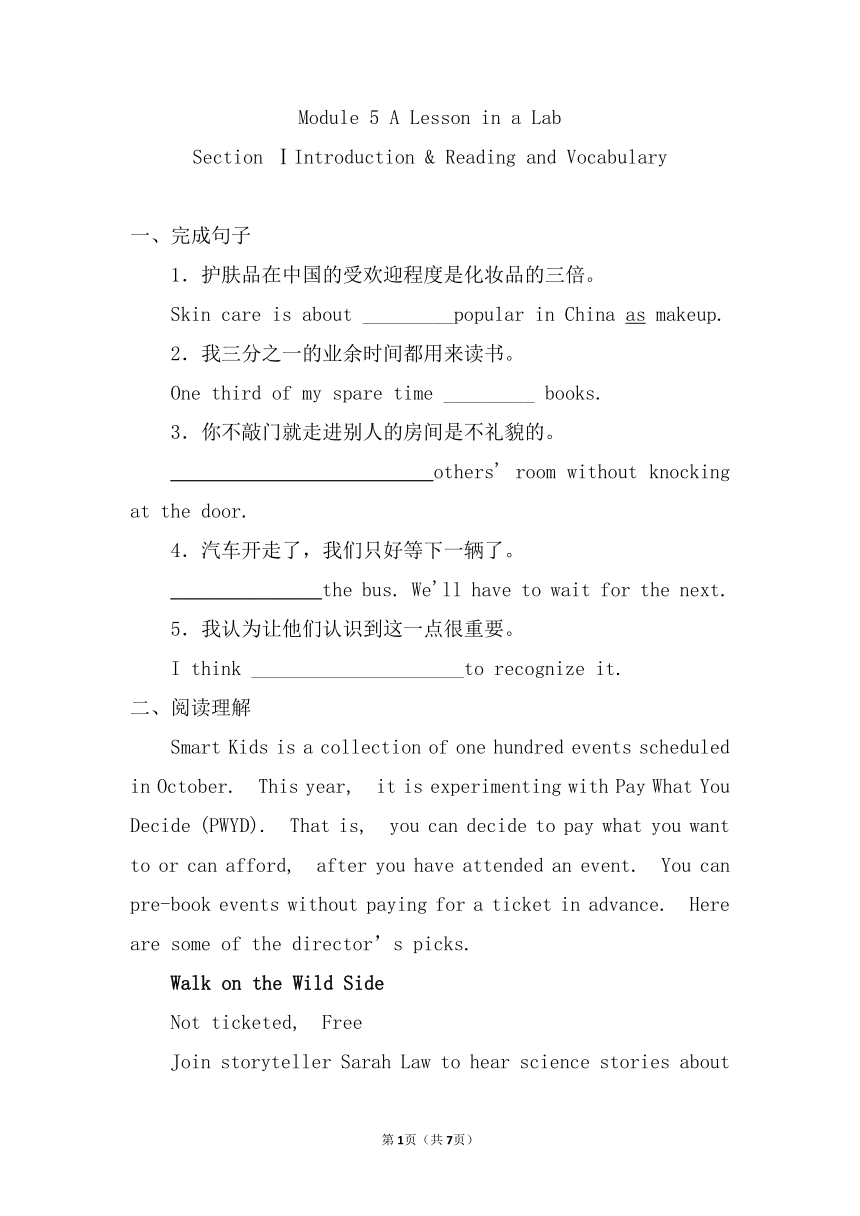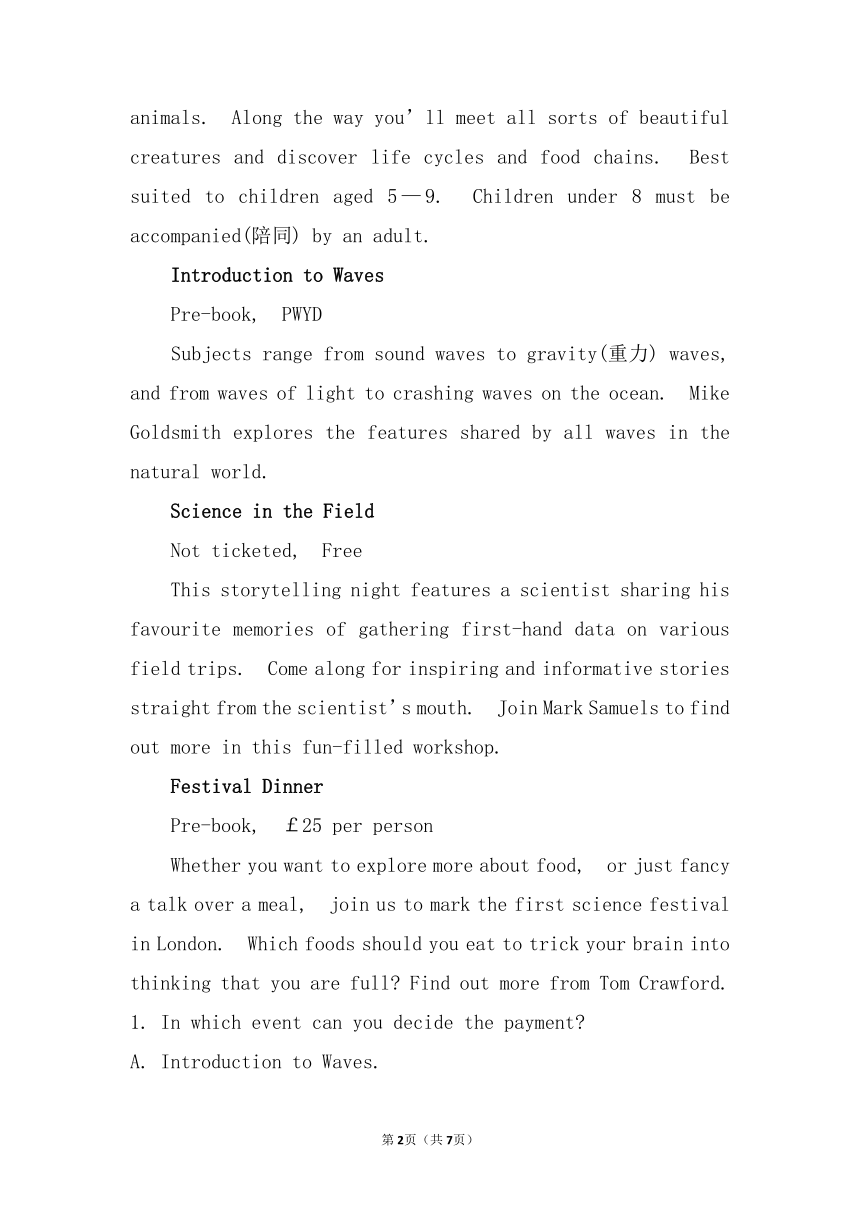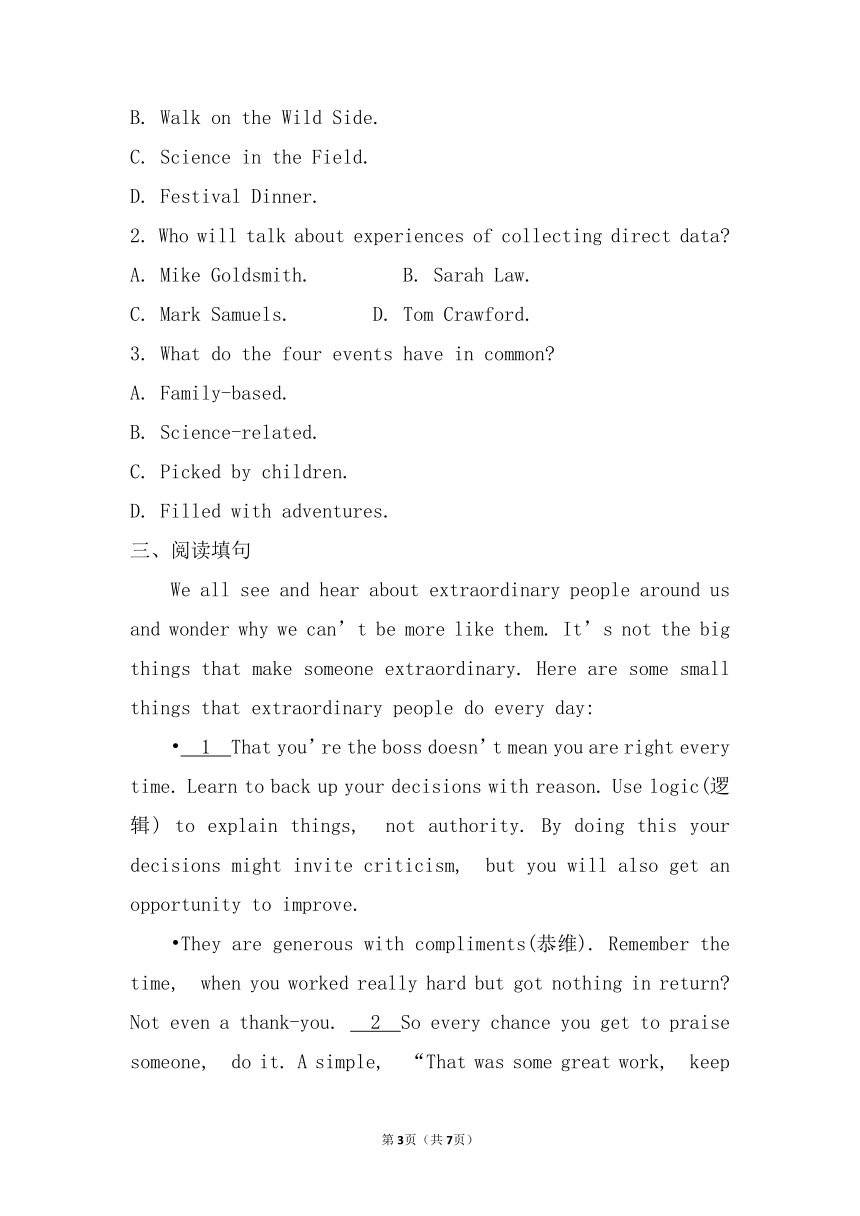外研版必修一:Module5 A Lesson in a Lab Introduction & Reading 课后基础练(含答案)
文档属性
| 名称 | 外研版必修一:Module5 A Lesson in a Lab Introduction & Reading 课后基础练(含答案) |  | |
| 格式 | doc | ||
| 文件大小 | 42.0KB | ||
| 资源类型 | 教案 | ||
| 版本资源 | 外研版 | ||
| 科目 | 英语 | ||
| 更新时间 | 2021-12-14 16:59:26 | ||
图片预览



文档简介
Module 5 A Lesson in a Lab
Section ⅠIntroduction & Reading and Vocabulary
一、完成句子
1.护肤品在中国的受欢迎程度是化妆品的三倍。
Skin care is about _________popular in China as makeup.
2.我三分之一的业余时间都用来读书。
One third of my spare time _________ books.
3.你不敲门就走进别人的房间是不礼貌的。
__________________________others' room without knocking at the door.
4.汽车开走了,我们只好等下一辆了。
_______________the bus. We'll have to wait for the next.
5.我认为让他们认识到这一点很重要。
I think _____________________to recognize it.
二、阅读理解
Smart Kids is a collection of one hundred events scheduled in October. This year, it is experimenting with Pay What You Decide (PWYD). That is, you can decide to pay what you want to or can afford, after you have attended an event. You can pre-book events without paying for a ticket in advance. Here are some of the director’s picks.
Walk on the Wild Side
Not ticketed, Free
Join storyteller Sarah Law to hear science stories about animals. Along the way you’ll meet all sorts of beautiful creatures and discover life cycles and food chains. Best suited to children aged 5—9. Children under 8 must be accompanied(陪同) by an adult.
Introduction to Waves
Pre-book, PWYD
Subjects range from sound waves to gravity(重力) waves, and from waves of light to crashing waves on the ocean. Mike Goldsmith explores the features shared by all waves in the natural world.
Science in the Field
Not ticketed, Free
This storytelling night features a scientist sharing his favourite memories of gathering first-hand data on various field e along for inspiring and informative stories straight from the scientist’s mouth. Join Mark Samuels to find out more in this fun-filled workshop.
Festival Dinner
Pre-book, £25 per person
Whether you want to explore more about food, or just fancy a talk over a meal, join us to mark the first science festival in London. Which foods should you eat to trick your brain into thinking that you are full Find out more from Tom Crawford.
1. In which event can you decide the payment
A. Introduction to Waves.
B. Walk on the Wild Side.
C. Science in the Field.
D. Festival Dinner.
2. Who will talk about experiences of collecting direct data
A. Mike Goldsmith. B. Sarah Law.
C. Mark Samuels. D. Tom Crawford.
3. What do the four events have in common
A. Family-based.
B. Science-related.
C. Picked by children.
D. Filled with adventures.
三、阅读填句
We all see and hear about extraordinary people around us and wonder why we can’t be more like them. It’s not the big things that make someone extraordinary. Here are some small things that extraordinary people do every day:
1 That you’re the boss doesn’t mean you are right every time. Learn to back up your decisions with reason. Use logic(逻辑) to explain things, not authority. By doing this your decisions might invite criticism, but you will also get an opportunity to improve.
They are generous with compliments(恭维). Remember the time, when you worked really hard but got nothing in return Not even a thank-you. 2 So every chance you get to praise someone, do it. A simple, “That was some great work, keep it up, ” can go a long way in making the employees feel great about themselves. 3
They are helpful. Never hesitate to help someone. It’s fairly simple but it goes a long way. Don’t say something vague(含糊)like, “Can I help you ” because they might just say, “No, I’m good. ” 4 “I had the same problem with this coffee machine in the morning. I think I have figured a way to make it work. ” Offer in a way that feels mutually beneficial.
They’re in charge of their emotions. Sometimes it is very important to stay silent. Especially when you’re angry, you don’t want to end up saying things you didn’t really mean to. So they take their time to think about what happened, and then come to a decision about how to deal with it. 5 Never be too casual with words or actions.
A. The key is to be specific.
B. They are open to criticism.
C. They are sensitive to others.
D. It hurts when your efforts are not recognised.
E. Before you say anything, consider others’ feelings.
F. A compliment can have a positive impact on their lives.
G. When you feel awkward receiving a compliment, give the person a smile.
四、串点成篇微表达
我想起(think of)了前几天老师做的一次实验。下面就是实验的步骤:首先在试管的底部 (at the bottom of) 放一块铜(copper),然后加入(add...to...) 一些盐和水的混合(mixture)溶液。放置两天以便于发现 (find out) 是否有氧化物生成。最后放入其他金属,并把这些金属的反应物 (reaction) 按顺序排列 (put...in order)。实验后,我们得出结论 (conclusion):铜不与盐发生反应 (react with)。
一、完成句子
1.three times as
2.is spent in reading
3.It is not polite of you to enter
4.There goes
5.it's important for them
二、阅读理解
1.A。细节理解题。根据第一段第二句“This year, it is experimenting with Pay What You Decide (PWYD). That is, you can decide to pay what you want to or can afford”可知, PWYD中你可以决定付款, 而四项活动中只有Introduction to Waves可以PWYD, 故选A。
2.C。细节理解题。根据Science in the Field活动中的“This storytelling night features a scientist sharing his favourite memories of gathering first-hand data on various field trips. ”可知, Mark Samuels会分享他最喜欢的关于在各种实地考察中收集第一手数据的回忆, 故选C。
3.B。推理判断题。通读全文可知, 这四项活动都是与科学有关的, 故选B。
三、阅读填句
1. B。根据下文“运用逻辑来解释事情, 而不是运用权威。这样做的话你的决策可能会引发批评, 但是你却得到了提高的机会。”可知, 本段讲述老板如果运用逻辑而不是权威来决策, 根据常理推断, 会令人愿意接受批评。B项“他们乐于接受批评”作为小标题合适。故选B。
2. D。根据本段标题“They are generous with compliments. ”(他们毫不吝啬赞美之词)和空前“还记得你认真学习或努力工作而没有任何回报的时候吧 甚至连句‘谢谢’都没有。”可推断本处为“你的努力不被承认时你会受到打击”, 既承接上文又与下文“当你有机会赞扬他人时, 一定要赞扬”相得益彰。故选D。
3. F。 根据上句“一句简单的赞美之词, 如‘做得真好, 继续努力, ’会让雇员在很长时间内都会感觉良好。”, 可知, 赞美能对他们的生活产生积极的影响, 顺承上文, 符合语境。故选F。
4.A。根据上文“because they might just say”可知别人可能以为你只是说说, 因此推断本处为“注意要具体一点”, 下文举例说明“I had the same problem with this coffee machine in the morning. I think I have figured a way to make it work. 早晨我也碰到这个咖啡机出现过同样的问题。我觉得我想到了一个办法能把它修好”, 前后连贯, 符合语境。故选A。
5. E。根据下文“Never be too casual with words or actions. 不要轻率说话或行动”, 可知“在说话之前, 考虑他人的感受” 符合语境。故选E。
四、串点成篇微表达
I thought of an experiment done by my teacher the other day. Here are the steps of the experiment. Firstly, put a piece of copper at the bottom of the tube. Secondly, add some mixture of water and salt to the tube. Leave it for two days to find out if an oxide can be produced. Lastly, put other metals into the mixture and put the reaction of the metals in order. After the experiment, we came to a conclusion that copper doesn't react with salt.
第1页(共1页)
Section ⅠIntroduction & Reading and Vocabulary
一、完成句子
1.护肤品在中国的受欢迎程度是化妆品的三倍。
Skin care is about _________popular in China as makeup.
2.我三分之一的业余时间都用来读书。
One third of my spare time _________ books.
3.你不敲门就走进别人的房间是不礼貌的。
__________________________others' room without knocking at the door.
4.汽车开走了,我们只好等下一辆了。
_______________the bus. We'll have to wait for the next.
5.我认为让他们认识到这一点很重要。
I think _____________________to recognize it.
二、阅读理解
Smart Kids is a collection of one hundred events scheduled in October. This year, it is experimenting with Pay What You Decide (PWYD). That is, you can decide to pay what you want to or can afford, after you have attended an event. You can pre-book events without paying for a ticket in advance. Here are some of the director’s picks.
Walk on the Wild Side
Not ticketed, Free
Join storyteller Sarah Law to hear science stories about animals. Along the way you’ll meet all sorts of beautiful creatures and discover life cycles and food chains. Best suited to children aged 5—9. Children under 8 must be accompanied(陪同) by an adult.
Introduction to Waves
Pre-book, PWYD
Subjects range from sound waves to gravity(重力) waves, and from waves of light to crashing waves on the ocean. Mike Goldsmith explores the features shared by all waves in the natural world.
Science in the Field
Not ticketed, Free
This storytelling night features a scientist sharing his favourite memories of gathering first-hand data on various field e along for inspiring and informative stories straight from the scientist’s mouth. Join Mark Samuels to find out more in this fun-filled workshop.
Festival Dinner
Pre-book, £25 per person
Whether you want to explore more about food, or just fancy a talk over a meal, join us to mark the first science festival in London. Which foods should you eat to trick your brain into thinking that you are full Find out more from Tom Crawford.
1. In which event can you decide the payment
A. Introduction to Waves.
B. Walk on the Wild Side.
C. Science in the Field.
D. Festival Dinner.
2. Who will talk about experiences of collecting direct data
A. Mike Goldsmith. B. Sarah Law.
C. Mark Samuels. D. Tom Crawford.
3. What do the four events have in common
A. Family-based.
B. Science-related.
C. Picked by children.
D. Filled with adventures.
三、阅读填句
We all see and hear about extraordinary people around us and wonder why we can’t be more like them. It’s not the big things that make someone extraordinary. Here are some small things that extraordinary people do every day:
1 That you’re the boss doesn’t mean you are right every time. Learn to back up your decisions with reason. Use logic(逻辑) to explain things, not authority. By doing this your decisions might invite criticism, but you will also get an opportunity to improve.
They are generous with compliments(恭维). Remember the time, when you worked really hard but got nothing in return Not even a thank-you. 2 So every chance you get to praise someone, do it. A simple, “That was some great work, keep it up, ” can go a long way in making the employees feel great about themselves. 3
They are helpful. Never hesitate to help someone. It’s fairly simple but it goes a long way. Don’t say something vague(含糊)like, “Can I help you ” because they might just say, “No, I’m good. ” 4 “I had the same problem with this coffee machine in the morning. I think I have figured a way to make it work. ” Offer in a way that feels mutually beneficial.
They’re in charge of their emotions. Sometimes it is very important to stay silent. Especially when you’re angry, you don’t want to end up saying things you didn’t really mean to. So they take their time to think about what happened, and then come to a decision about how to deal with it. 5 Never be too casual with words or actions.
A. The key is to be specific.
B. They are open to criticism.
C. They are sensitive to others.
D. It hurts when your efforts are not recognised.
E. Before you say anything, consider others’ feelings.
F. A compliment can have a positive impact on their lives.
G. When you feel awkward receiving a compliment, give the person a smile.
四、串点成篇微表达
我想起(think of)了前几天老师做的一次实验。下面就是实验的步骤:首先在试管的底部 (at the bottom of) 放一块铜(copper),然后加入(add...to...) 一些盐和水的混合(mixture)溶液。放置两天以便于发现 (find out) 是否有氧化物生成。最后放入其他金属,并把这些金属的反应物 (reaction) 按顺序排列 (put...in order)。实验后,我们得出结论 (conclusion):铜不与盐发生反应 (react with)。
一、完成句子
1.three times as
2.is spent in reading
3.It is not polite of you to enter
4.There goes
5.it's important for them
二、阅读理解
1.A。细节理解题。根据第一段第二句“This year, it is experimenting with Pay What You Decide (PWYD). That is, you can decide to pay what you want to or can afford”可知, PWYD中你可以决定付款, 而四项活动中只有Introduction to Waves可以PWYD, 故选A。
2.C。细节理解题。根据Science in the Field活动中的“This storytelling night features a scientist sharing his favourite memories of gathering first-hand data on various field trips. ”可知, Mark Samuels会分享他最喜欢的关于在各种实地考察中收集第一手数据的回忆, 故选C。
3.B。推理判断题。通读全文可知, 这四项活动都是与科学有关的, 故选B。
三、阅读填句
1. B。根据下文“运用逻辑来解释事情, 而不是运用权威。这样做的话你的决策可能会引发批评, 但是你却得到了提高的机会。”可知, 本段讲述老板如果运用逻辑而不是权威来决策, 根据常理推断, 会令人愿意接受批评。B项“他们乐于接受批评”作为小标题合适。故选B。
2. D。根据本段标题“They are generous with compliments. ”(他们毫不吝啬赞美之词)和空前“还记得你认真学习或努力工作而没有任何回报的时候吧 甚至连句‘谢谢’都没有。”可推断本处为“你的努力不被承认时你会受到打击”, 既承接上文又与下文“当你有机会赞扬他人时, 一定要赞扬”相得益彰。故选D。
3. F。 根据上句“一句简单的赞美之词, 如‘做得真好, 继续努力, ’会让雇员在很长时间内都会感觉良好。”, 可知, 赞美能对他们的生活产生积极的影响, 顺承上文, 符合语境。故选F。
4.A。根据上文“because they might just say”可知别人可能以为你只是说说, 因此推断本处为“注意要具体一点”, 下文举例说明“I had the same problem with this coffee machine in the morning. I think I have figured a way to make it work. 早晨我也碰到这个咖啡机出现过同样的问题。我觉得我想到了一个办法能把它修好”, 前后连贯, 符合语境。故选A。
5. E。根据下文“Never be too casual with words or actions. 不要轻率说话或行动”, 可知“在说话之前, 考虑他人的感受” 符合语境。故选E。
四、串点成篇微表达
I thought of an experiment done by my teacher the other day. Here are the steps of the experiment. Firstly, put a piece of copper at the bottom of the tube. Secondly, add some mixture of water and salt to the tube. Leave it for two days to find out if an oxide can be produced. Lastly, put other metals into the mixture and put the reaction of the metals in order. After the experiment, we came to a conclusion that copper doesn't react with salt.
第1页(共1页)
